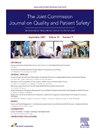Utilizing Quality Improvement Methodology to Decrease Surgical Delays
IF 2.4
Q2 HEALTH CARE SCIENCES & SERVICES
Joint Commission journal on quality and patient safety
Pub Date : 2025-07-01
DOI:10.1016/j.jcjq.2025.04.004
引用次数: 0
Abstract
Background
Surgical delays waste time and space and lead to patient safety concerns, staff and patient dissatisfaction, and increased operating room (OR) costs. Preventing delays is crucial to OR safety and efficiency. A quality improvement (QI) initiative was designed to identify common delay causes and implement targeted interventions to reduce overall case delays and first start case delays.
Methods
At a facility with eight full-time ORs, up to 21.5% of cases were delayed per month. Through a preintervention audit, preoperative paperwork issues were determined to be the most common cause of delays. Examination of the current state revealed irregular processes for preoperative paperwork completion and unreliable communication between the provider and preoperative teams. The paperwork completion process and preoperative communication were standardized. Cases were audited for paperwork issues, and rates of delays were analyzed using data collected from the electronic health record and OR scheduling systems.
Results
This project achieved a 39.2% relative reduction in overall delays and a 25.0% relative reduction in first start delays. The proportion of all cases delayed by paperwork was reduced by 60.1%, and the proportion of first start cases delayed due to paperwork was reduced by 49.6%. The rate of paperwork issues in all cases decreased by 43.3%. The project has matured to sustainability with lasting improvement in delay rates despite increasing surgical case volume.
Conclusion
These interventions substantially decreased total and first start delays, as well as delays due to paperwork issues. Understanding current state, designing appropriate interventions, and securing frontline staff buy-in are critical to achieving a QI goal. Through these principles, simple interventions considerably reduced case delays without added cost.
利用质量改进方法减少手术延误。
背景:手术延误浪费时间和空间,导致患者安全问题,工作人员和患者的不满,并增加手术室(OR)成本。防止延误对手术室的安全和效率至关重要。设计了一项质量改进(QI)倡议,以确定常见的延误原因并实施有针对性的干预措施,以减少总体病例延误和首次启动病例延误。方法:在一个拥有8名全职手术室的机构,每月高达21.5%的病例延迟。通过干预前审计,术前文书工作问题被确定为延误的最常见原因。对当前状态的检查显示,术前文书工作的完成过程不规范,提供者和术前团队之间的沟通不可靠。规范了文书工作的完成流程和术前沟通。对病例的文书问题进行审计,并使用从电子健康记录和手术室调度系统收集的数据分析延误率。结果:该项目总体延迟相对减少39.2%,首次启动延迟相对减少25.0%。由于文书工作而延误的所有案件的比例降低了60.1%,由于文书工作而延误的首次启动案件的比例降低了49.6%。所有案件的文书问题率下降了43.3%。尽管手术病例数量不断增加,但该项目已成熟到可持续性,延迟率持续改善。结论:这些干预措施大大减少了总延迟和首次开始延迟,以及由于文书问题造成的延迟。了解现状,设计适当的干预措施,并确保一线员工的支持是实现质量保证目标的关键。通过这些原则,简单的干预措施在不增加成本的情况下大大减少了病例延误。
本文章由计算机程序翻译,如有差异,请以英文原文为准。
求助全文
约1分钟内获得全文
求助全文
来源期刊

Joint Commission journal on quality and patient safety
HEALTH CARE SCIENCES & SERVICES-
CiteScore
3.80
自引率
4.30%
发文量
116
审稿时长
49 days
 求助内容:
求助内容: 应助结果提醒方式:
应助结果提醒方式:


